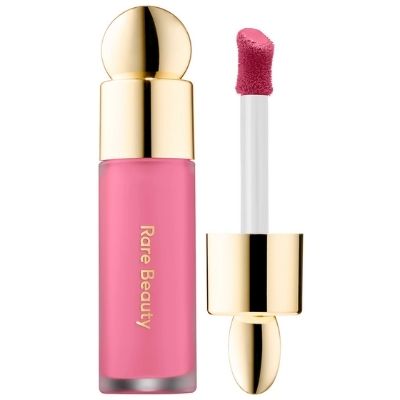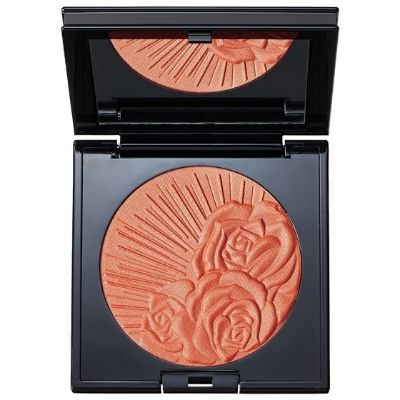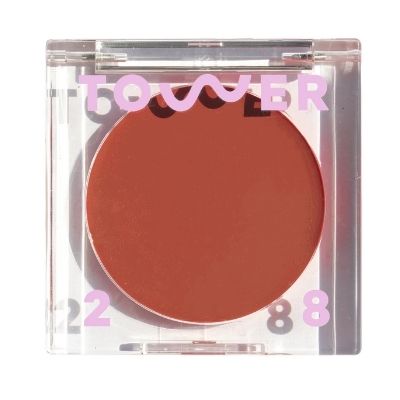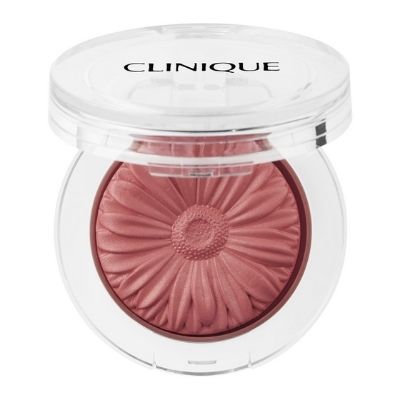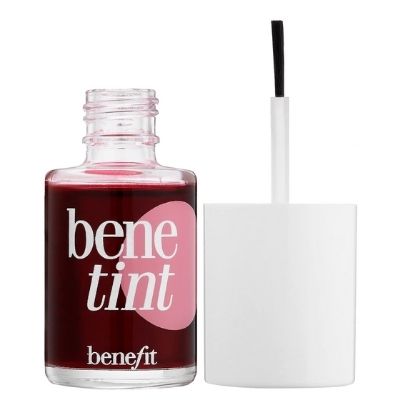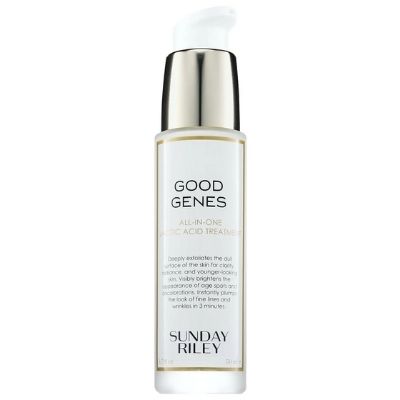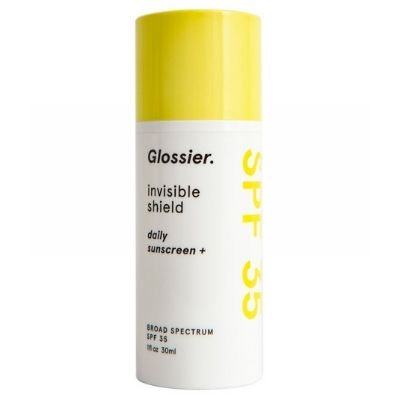Blush Guide: Everything You Ever Needed to Know About Applying the Perfect Blush
If you watched Madison Beer’s beauty routine video as much as our beauty editor has, then you’re likely on the same page when we say this: Gone are the days when anything but light, natural cheeks were acceptable because blush is finally having its revival.
Whether you’ve been blushing up your cheeks for years or you’re ready to dip your toes into TikTok’s famous blush trends (there are quite a few at this point), there’s a lot to know about where to place it, what tools to apply it with, what formula to try, what colors work with your skin tone, and more—and we got to the bottom of it, thanks to a few makeup artists.
What is Blush?
Blush was created as a way to make yourself look naturally flushed—like when the kid next to you in kindergarten calls you pretty or when your mom tries to have the sex talk with you as a teenager. When we apply a full face of foundation, concealer, and powder, our skin can look washed out and flat, as our natural skin changes color and has dimension. Blush brings a little extra life to your face. It can be natural and light for an added bit of color or go bold and bright to enhance your look.
How to Choose the Right Blush Shade
Celebrity makeup artists Robert Sesnek and Neil Scibelli both said the best blush color is the one that works well with your undertone (warm, cool, or neutral). As long as you find a shade within your undertone, you can go as deep, light, natural, and bright as you want to fit your look. Use this as a guide to help you find a shade that makes you feel good:
Fair Skin
Light, dusty pinks and sheer peaches add a natural flush, while bright pinks of all undertones are perfect for a bold statement.
Medium Skin
Bright pink looks great on a cool undertone, while coral and orange bring out warm tones.
Olive Skin
Anything with a golden undertone (or a gold shimmer running through it) will bring out the rich, warm tones in your skin. If you’re a cool olive, you can opt for light plums and cool pinks.
Deep/Dark Skin
Coral, brick red, and berry tones tend to have the depth and dimension for your complexion.
Creams vs. Liquids vs. Powder Blushes
There is much more on the scene than your traditional powder blush these days. Not sure where to start? Here’s the difference between each formula, our favorite blushes in each, and why there’s room for all three in your collection:
Cream
A cream blush usually comes in a stick or pot and is applied with a brush or beauty sponge. It’s much thicker than a liquid blush, but it’s easier to apply with a light hand because you can control how much product you pick up on your brush. Cream blushes blend seamlessly into the skin, whether you have dry or oily skin. If you’re worried about your makeup fading away after a few hours, creams might be the way to go. “Cream blushes tend to bind to the skin a bit better, which also stay in place longer,” Scibelli said.
Higher Standard Satin Matte Cream Blush
These pigmented cream blushes were made with deep skin in mind, offering varying ranges of shades that all show up on the lightest to deepest skin tones.
Soft Pop Blush Stick
This is one of the most blendable, foolproof blushes on the market right now, thanks to the built-in brush that blends the product right into whatever you have underneath (whether you're wearing foundation or your moisturizer).
BeachPlease Lip + Cheek Cream Blush
Use this if you want dewy, glassy cheeks that last all day long.
Liquid
A liquid blush is a bit newer to the market, but it took the world by storm, thanks to Glossier’s famed Cloud Paint. Some liquid blushes have a serum texture that make them sheer, blendable, and soft; however, others are thicker in texture, leading to an opaque formula that can be both dewy and matte. This product is best applied with a stippling brush that can buff the product into your cheeks lightly.
Vision Flush Blush
Use this on your eyes, cheeks, and lips for a monochromatic look.
Cloud Paint
The blush that started it all: Glossier Cloud Paint is the gold standard of liquid blushes for its easy, blendable formula.
Sweet Cheeks Soft Cheek Tint Blush
Our editor likes this inexpensive liquid blush even more than Madison Beer's high-end favorite—it's that good.
Powder
You likely already know a bit about powder blush because it was probably the first blush formulation you ever tried. It’s classic, easy to apply, and basically foolproof when using a lightly pigmented product. It comes in matte and shimmer formulas that glide on easily and is usually applied with a brush.
Blush
It's the most popular blush in the world—and for good reason. Celebrities like Meghan Markle love the natural flush that "Orgasm" adds to your cheeks, while makeup artists swear by the bright shades in NARS's arsenal for editorial looks.
Cheek Pop
This is the most beginner-friendly blush on the market because it's sheer, buildable, and comes in tons of gorgeous shades.
Blush Box
Sesnek swears by these $6 blushes. "I find myself reaching for these because of the silky texture as well as the color selection."
Matte or Shimmer?
A matte blush adds a wash of color across your face without adding any glitter or shimmer. They both come in liquid, cream, and powder options, but creams and liquids usually have a dewy, shiny finish that powder matte blushes won’t have. This type is for you if you are afraid of adding extra texture or shine to the face.
Benetint Rose Lip & Cheek Tint
Benefit's classic serum, liquid blush adds a stain to the cheeks that gives you a natural flush.
Blushed Duo
This inexpensive duo gives you two silky matte blush options. You can also mix them together to make your custom color.
On the other hand, a shimmery blush has shimmer and shine running through the formula. It adds an extra bit of glimmer to the cheeks and blends seamlessly with any highlighter or illuminator you might have on. This type is great for beginners because shimmery blushes are usually softer in texture, so they’re easier to blend. However, they can emphasize texture if you’re using a product that’s too gritty or has chunky shimmers.
Age Perfect Radiant Satin Blush
If you want a shimmery blush that won't make you look too glowy, this one has a slight sheen that helps it blend beautifully into the skin.
Baked Blush
This shimmery blush is a must-have in our editor's collection for the major glow it adds to cheeks without clinging to texture.
Cream Blushlight
Cream blush mixed with highlighter? Sign us up. These have a gorgeous, fine shimmer running through them that'll make you look like you just got back from vacay.
How to Apply Blush
Blush is primarily applied with a brush, but the size and shape vary depending on the look you’re going for. You can also apply cream and liquid blushes with a beauty sponge for a sheer, blended-out look. And for a messy, editorial look, smudging it on your cheeks with your fingertips is the way to go.
Small Stipple Brush
This is the best brush for applying cream and liquid blushes because it gives you a lot of control and applies a sheer layer.
Face Shaping Brush 125
The angled tip on this brush will help you apply blush to the back of the cheekbones and blend toward the temples.
Where to Apply Blush?
The ever-popular question of where to apply your blush has a different answer depending on who you ask, especially depending on what the trends are.
In 2021, blush is bold, and it isn’t just for your cheeks anymore. Thanks to TikTok, we’ve seen a rise in the “E-girl” blush, where you apply a little blush to the tip of your nose (making your nose appear button-like), the wave blush, where you apply it in a wave across your nose and under your eyes (to appear sun-kissed), and Madison Beer’s blush, where she basically adds blush to her whole face.
But is that the right placement for you? If you’re going for a natural look, Scibelli recommended following the “natural structure of your cheekbones.” He suggested smiling and applying your blush just above the apples of your cheeks and then blending out toward your temples. This will lift the cheekbones and add a little extra color to your face without going overboard. But you can also use blush to enhance your natural face shape, add balance, and achieve a specific look. Follow these guidelines depending on the look you’re hoping to achieve:
- For a natural look: apply blush to the apples of the cheek and blend toward the temples/ears
- To lift your face and make it appear more oval-shaped: apply blush to the back of the cheekbones into your temples
- For a sunkissed glow: apply blush underneath your eyes, across the bridge of the nose, and back toward the ear
- For an editorial look: apply your blush to the back of the cheekbones, blending into your eyeshadow for a draped effect
- To shorten your face and create balance: apply blush to the center of the apples and out, just toward your eyes, avoiding blending too far out toward the temples.
Regardless of your face shape, celebrity makeup artist Robert Sesnek said blending is key. “Blending and diffusing the color in a buffing motion will soften all lines and edges.”
How to Get Blush to Last All Day Long
You can use a makeup primer underneath your complexion products to help makeup stay in place all day (we love one with a tacky finish, like Milk Makeup Hydro Grip). For all-day wear, Scibelli recommended using a cream blush and setting it with a powder blush in a similar shade or your translucent setting powder. Your blush seriously won’t budge.
Translucent Setting Powder
This is the end all, be all setting powder every makeup artist keeps in their kit—it also works well to set your cream blushes in place when you use a fluffy brush.
How to Avoid “Clown” Blush
We all know the dreaded moment when you realize you went a little too heavy-handed and you look like you just stepped away from your circus audition. To avoid this altogether, Sesnek recommended adding your blush sparingly and with a light hand. “It’s always easier to add then subtract when it comes to blush.” But fear not: If you’ve overdone it, there is a way to come back. Sesnek suggested buffing a translucent powder on top of your blush to sheer the intensity and soften the look. You can also take your foundation brush or sponge with no new product and blend out the edges to help it blend seamlessly into your skin.
I Have Rosacea—Can I Still Wear Blush?
Just because you have rosacea, acne, or just a natural flush to your skin doesn’t mean you have to forgo blush altogether. Instead of adding more pinky, red tones to your skin, opt for a neutral-toned brown shade. The neutral tones work with every undertone, and the brown color counteracts any natural redness you have in your skin. But who says redness has to be covered anyway? You can always rock your favorite color blush regardless—there are no rules.
Flush Balm Cream Blush
This has a creamy, slightly yellow tone that works with most skin tones.
Blush Color Infusion
If you want to add a sheer, light shimmer to your cheeks, this is the neutral brown blush to go for.
The post Blush Guide: Everything You Ever Needed to Know About Applying the Perfect Blush appeared first on The Everygirl.



